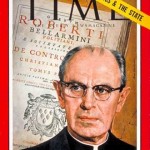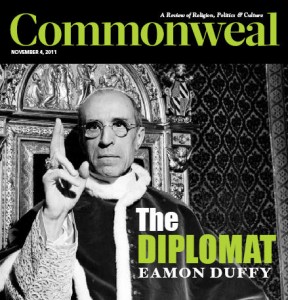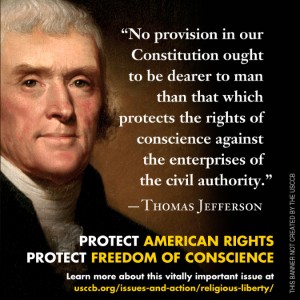Earlier today, I shared the latest from the USCCB’s stance on religious liberty. Bishop William Lori’s Ad-hoc Committee on Religious Freedom’s statement was long, and involved. From what I read, it seemed well thought out, above board, and non-partisan. It even dipped into the history of religious freedom in our country, though more historical background of this type needs to be shared with the faithful and all citizens.
Commonweal evidently sees this whole episode of the HHS Mandate differently, lamenting the poor timing of the bishop’s response in light of it being an election year etc. And so they cry “partisanship” as being the motive from the same bishops who a few short months ago were decried by Catholics on the conservative side as being beholding to the Democrat Party.
The bishops must be chameleons or something. Says Commonweal,
The bishops are right to call for vigilance on behalf of religious liberty. There are influential currents of opinion today that advocate restricting the presence of religion in public life and would reduce religious liberty to the freedom of individuals or congregations to worship as they please. That is not the American way. There should be considerable room for government to cooperate with religious groups as with other non-governmental bodies in serving the common good. Unfortunately, the argument made by the bishops as well as their proposed tactics for public action undermine their case. Worse, the tenor of the bishops’ statement runs the risk of making this into a partisan issue during a presidential election in which the leaders of one party have made outlandish claims about a “war on religion” or a “war against the Catholic Church.”
The USCCB’s statement vastly exaggerates the extent to which American freedoms of all sorts and of religious freedom in particular are threatened. Church-state relations are complicated, requiring the careful weighing of competing moral claims. The USCCB’s statement fails to acknowledge that fact. Worse, strangely absent from the list of examples provided by the bishops is the best-documented case of growing hostility to religious presence in the United States: hostility to Islam. Unless the bishops correct that oversight, their statement will only feed the impression that this “campaign” for religious freedom has been politically tailored. This silence is especially striking in view of the parallels between anti-Muslim sentiment today and the prejudice encountered by Catholic immigrants in the nineteenth century. If religious freedom becomes a partisan issue, its future is sure to grow dimmer, not brighter. Religious liberty, absolutely. Partisan politics, no.
Surely the editors at Commonweal realize that the struggle for religious freedom which the bishops endeavor to lead the faithful upon will benefit not just the Catholic Church, but all churches, and all faiths. The USSCB statement made that quite clear,
This is not a Catholic issue. This is not a Jewish issue. This is not an Orthodox, Mormon, or Muslim issue. It is an American issue.
 And this crisis is not a partisan issue. Far from it. Was John Courtney Murray, SJ being a party apparatchik when he wrote his excellent book We Hold These Truths: Catholic Reflections on the American Proposition? His writings are what prompted me to draft the White House petition that the Administration responded to back on February 10. Fr. Murray’s scholarship makes it pretty clear that what the government did with the HHS Mandate is unprecedented.
And this crisis is not a partisan issue. Far from it. Was John Courtney Murray, SJ being a party apparatchik when he wrote his excellent book We Hold These Truths: Catholic Reflections on the American Proposition? His writings are what prompted me to draft the White House petition that the Administration responded to back on February 10. Fr. Murray’s scholarship makes it pretty clear that what the government did with the HHS Mandate is unprecedented.
Is Bishop Thomas J. Curry some partisan conservative lacky of the party not holding the White House currently? Or is he just another wacky priest with enough time on his hands to have become a person with a comprehensive understanding of the historical background of religious freedom in our country. A prelate (not a member of Bishop Lori’s committee) who understands the roots of the current crisis and the breadth of the struggle as various actors amongst religious groups and the state, seek to define their proper roles within a free society.
When sharing the latest statement by the bishops this morning I noted that, “the bishops, in a step that is unprecedented, have unanimously responded to the HHS Mandate, and other threats to religious liberty, with firm resolve. That fact alone should wake folks up to the idea that this time, it really is different.”
I must admit, I’m puzzled by the response of the folks over at Commonweal. Unlike the statement today given by the shepherds of the flock, complete with footnotes, and quotes from recent speeches of Pope Benedict XIV, no less, the three dismissive paragraphs from our brethren at the magazine leave me wondering.
In the grand scheme of things, in this realm that definitely concerns the faithful, and all freedom loving people from every walk of life, who will stand against these unprecedented moves by the government to claim the right to act as arbiter of what is Truth? If not the Church, then who? And if we will not follow her as she acts now, when the aggression is so obvious, and so detrimental to the value of religious freedom that Mother Church proclaimed in Dignitatus Humanae, written by Fr. John Courtney Murray, then when will we follow her lead? For,
It is in accordance with their dignity as persons-that is, beings endowed with reason and free will and therefore privileged to bear personal responsibility-that all men should be at once impelled by nature and also bound by a moral obligation to seek the truth, especially religious truth. They are also bound to adhere to the truth, once it is known, and to order their whole lives in accord with the demands of truth. However, men cannot discharge these obligations in a manner in keeping with their own nature unless they enjoy immunity from external coercion as well as psychological freedom. Therefore the right to religious freedom has its foundation not in the subjective disposition of the person, but in his very nature. In consequence, the right to this immunity continues to exist even in those who do not live up to their obligation of seeking the truth and adhering to it and the exercise of this right is not to be impeded, provided that just public order be observed.
I am not of the mind to say in all things, “my bishops, right or wrong.” I don’t place myself so blithely and unthinkingly into a camp such as that. But turning away from their leadership in this current crisis, because the timing doesn’t happen to be convenient, is no way to respond when the actual guarantor of our freedoms, and His Church, has been assailed in such an unprovoked and destructive manner.













